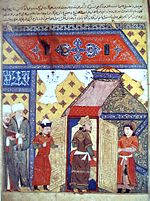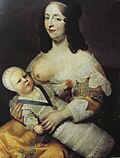The Turco-Mongol or Turko-Mongol tradition was an ethnocultural synthesis that arose in Asia during the 14th century among the ruling elites of the Golden...
14 KB (1,601 words) - 02:49, 2 November 2024
historian Robert L. Canfield, the Turco-Persian tradition was Persianate in that it was centered on a lettered tradition of Iranian origin; it was Turkic...
46 KB (5,632 words) - 17:06, 21 October 2024
Family tree of the Mongol Khans Timurid family tree Family tree of the Mughal Emperors Safavid dynasty family tree Turco-Mongol tradition Columbia Encyclopedia...
9 KB (307 words) - 16:51, 28 September 2024
The Mongol Empire invaded and conquered much of Kievan Rus' in the mid-13th century, sacking numerous cities including the largest: Kiev (50,000 inhabitants)...
39 KB (4,551 words) - 23:42, 20 November 2024
Zingis Khan and of Mr. Locke". Religion in Mongolia Turco-Mongol tradition Nomadic empire Mongol invasions and conquests Early Muslim conquests Genghis...
29 KB (3,769 words) - 13:17, 31 August 2024
The Mongol Empire of the 13th and 14th centuries was the largest contiguous empire in history. Originating in present-day Mongolia in East Asia, the Mongol...
130 KB (15,222 words) - 16:36, 21 November 2024
Turkic languages (redirect from Turco-Tartar languages)
Proto-Mongols approximately during the first millennium BC; the shared cultural tradition between the two Eurasian nomadic groups is called the "Turco-Mongol"...
97 KB (4,878 words) - 14:29, 14 November 2024
Shamanism in Siberia The Secret History of the Mongols Tibetan mythology Tungusic mythology Turco-Mongol tradition Turkic mythology Sproul 1979, p. 218 Nassen-Bayer...
6 KB (732 words) - 06:14, 7 July 2024
share a common Turco-Mongol tradition, both share a common Ancient East Eurasian lineage, and both had been within the nucleus of the Mongol Empire. Furthermore...
4 KB (353 words) - 04:08, 13 October 2024
later founded the Mughal Empire of Central Asia and South Asia. Turco-Mongol tradition Hajji Beg Barlas Grupper, S. M. 'A Barulas Family Narrative in the...
7 KB (679 words) - 12:20, 16 November 2024
The Turco-Mongol sabre, alternatively known as the Eurasian sabre or nomadic sabre, was a type of sword used by a variety of nomadic peoples of the Eurasian...
11 KB (1,318 words) - 02:06, 16 September 2024
Batu Khan (c. 1205–1255) was a Mongol ruler and founder of the Golden Horde, a constituent of the Mongol Empire established after Genghis Khan's demise...
28 KB (3,447 words) - 17:30, 9 November 2024
From that point on, all of the khans adopt Islamic names following Turco-Mongol tradition. Following centuries, after dissolution of Golden Horde, all khans...
15 KB (1,883 words) - 18:11, 30 September 2024
Yuan dynasty (redirect from Yuan (Mongol) dynasty)
literally "Great Yuan State"), was a Mongol-led imperial dynasty of China and a successor state to the Mongol Empire after its division. It was established...
121 KB (13,876 words) - 06:19, 20 November 2024
Mughal people (category Mongol peoples)
India, the term Mughal refers Gürkani or Timurids. Khan Mughal Turco-Mongol tradition Levin, S. F. (2006). "Mughal". In Malik, Hafeez; Gankovsky, Yuri...
6 KB (469 words) - 00:40, 12 November 2024
specially done to emulate the Timurid dynasty, that followed the Turco-Mongol tradition of appointing the eldest son of a sovereign to govern a prominent...
83 KB (10,706 words) - 13:18, 12 November 2024
The Mongols are an East Asian ethnic group native to Mongolia, China (Inner Mongolia and other 11 autonomous territories), as well as Buryatia and Kalmykia...
107 KB (11,341 words) - 22:26, 20 October 2024
shaman. Turkic history Turkic migration Turkic mythology Turco-Persian tradition Turco-Mongol tradition Turkology Yunusbayev et al. 2015. Garibova, Jala (2011)...
199 KB (21,457 words) - 17:53, 20 November 2024
imperial wet nurses of the Mughal court were given honours in the Turco-Mongol tradition. Wet nursing used to be commonplace in the United Kingdom. Working-class...
34 KB (4,509 words) - 04:15, 18 September 2024
Ilkhanate (redirect from Mongol Hulagu empire)
The Ilkhanate or Il-khanate was a Mongol khanate founded in the southwestern territories of the Mongol Empire. It was ruled by the Il-Khans or Ilkhanids...
60 KB (6,169 words) - 17:47, 22 November 2024
35–36) Balabanlilar, Lisa (2010). "The Begims of the Mystic Feast: Turco-Mongol Tradition in the Mughal Harem". The Journal of Asian Studies. 69 (1). Association...
34 KB (4,079 words) - 05:49, 6 November 2024
number of horse tails (three, two, and one respectively; a symbol of Turco-Mongol tradition) or peacock tails that the bearers were entitled to display on their...
26 KB (2,577 words) - 04:34, 10 November 2024
also known as the Ulus of Jochi. During the Golden Horde period, a Turco-Mongol tradition emerged among the ruling elite wherein Turkicised descendants of...
237 KB (22,028 words) - 07:11, 17 November 2024
ISBN 0312224516. Balabanlilar, Lisa (2010). "The Begims of the Mystic Feast: Turco-Mongol Tradition in the Mughal Harem". The Journal of Asian Studies. 69 (1): 123–147...
12 KB (1,343 words) - 21:34, 22 October 2024
confederations History of Central Asia Hephthalites Xionites Tatar invasions Turco-Mongol tradition Pre-modern human migration https://www.britannica...
46 KB (5,813 words) - 21:17, 25 October 2024
Turkic mythology (redirect from Turco-Mongol mythology)
way of life of Turkic and Mongol peoples in ancient times. Turkic mythology shares numerous ideas and practices with Mongol mythology. Turkic mythology...
24 KB (2,471 words) - 09:06, 2 October 2024
speak Mongolic languages. Their ancestors are referred to as Proto-Mongols. The largest contemporary Mongolic ethnic group is the Mongols. Mongolic-speaking...
41 KB (4,360 words) - 11:16, 17 September 2024
1438, Husayn Bayqara's parents were Ghiyas ud-din Mansur Mirza of the Turco-Mongol Barlas tribe and his wife, Firuza Sultan Begum. His parents had four...
24 KB (2,925 words) - 06:14, 5 November 2024
Timurid Empire (category Mongol states)
The Timurid Empire was a late medieval, culturally Persianate Turco-Mongol empire that dominated Greater Iran in the early 15th century, comprising modern-day...
67 KB (7,679 words) - 08:05, 21 November 2024
The Mongolic languages are a language family spoken by the Mongolic peoples in Eastern Europe, Central Asia, North Asia and East Asia, mostly in Mongolia...
31 KB (3,297 words) - 23:07, 20 August 2024






















